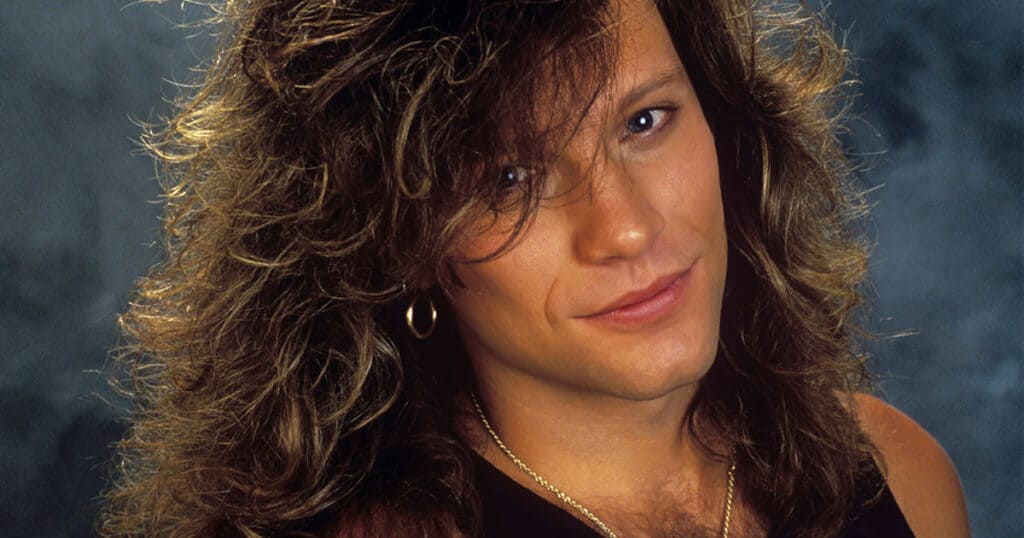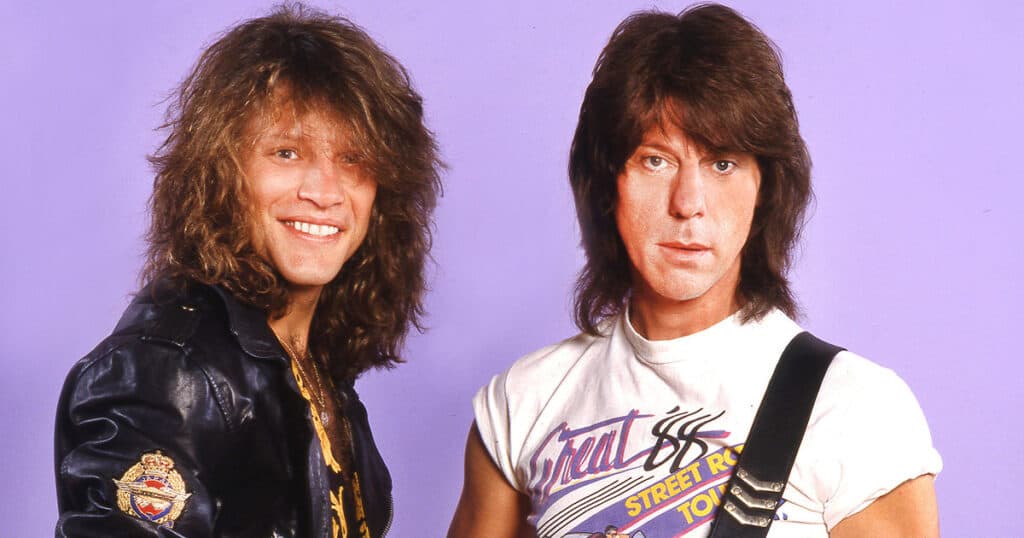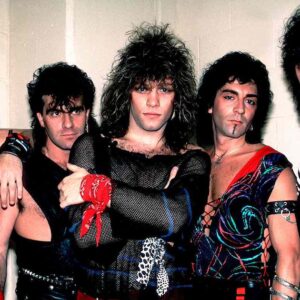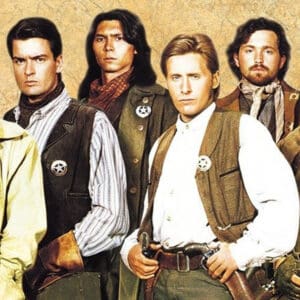Last Updated on December 29, 2023
As Skidrow frontman Sebastian Bach sat down after a long day of metal rocking to enjoy some MTV, an energetic pretty boy suddenly appeared before the eyes of Bach. And all he could think was, “What the f*ck is a Bon Jovi and What the f*ck is with all those teeth?”, as smiling was not exactly considered cool amongst the metal-heads of the time. And we can’t forget Twister Sister frontman Dee Snider, who believes that he can pin point the exact moment that metal started to become less metal….when Bon Jovi smiled, creating what many like to call “happy metal”. While others say that Bon Jovi’s music brought a fresh new light to the genre causing millions of other smiles to spread throughout the world. Not being completely miserable and angry all the time was a bold controversial move in the world of rock but that’s what the boys of Bon Jovi did… they made rock n roll fun again. This resulted in some rocking pop hits or some popping rock hit, as well as power ballads galore, that will make you fall in love and break your heart but in the most entertaining of ways. As we all know the music world is a vicious beast that often feeds off of nothing hairspray, spandex, motorcycles, leather jackets and even more hair spray. Even though Jon Bon Jovi dismisses the “hair band” label…. even though he is in a band and has a lot of hair… And yes that hair is a little grayer now but their music career is still growing strong, right? I’m not sure actually… so let’s find out. WTF Happened to…BON JOVI?
But to truly understand what the fuck happened to Bon Jovi, we go back to the beginning. And the beginning began when the band released their self-titled album in 1984. OK, so variations of Bon Jovi bounced around the NJ club scene and small studios before that (yes, of course Jon Bon Jovi picked up the guitar as a teen, but their origins aren’t all that different from most of their kind. It’s their debut single that made them, yes, runaways.
With “Runaway” having legs on radio, Bon Jovi – the band, that is (originally named Johnny Electric) – could be formed, with Jon Bon Jovi on vocals, Richie Sambora, Tico Torres on drums, Alec John Such on bass, and David Bryan on keyboard, who ditched Juilliard to play with the band.
In 1986, just barely into their superstardom, Bon Jovi released SLIPPERY WHEN WET, led by their first #1 songs, “You Give Love a Bad Name” and “Livin’ on a Prayer”, an eventual VMA winner and scientifically deemed one of the happiest songs ever (and no doubt a top karaoke choice). “Wanted Dead or Alive” also helped it eventually go diamond at 15+ million copies (that’s PURPLE RAIN and THE JOSHUA TREE territory).
They would follow it up by hounding on their East Coast roots with 1988’s NEW JERSEY, going 7x platinum off of #1 hits “Bad Medicine” and “I’ll Be There for You.” Their pop hair metal
sound earned them attention from the AMAs and landed them on a constant touring rotation, with hundreds of shows between 1986-1990.

And then Jon Bon Jovi turned to drugs…OK, he didn’t. There was no cocaine or speed or whatever their contemporaries were using. There were no sex tapes like Motley Crue or dismemberments like Def Leppard. There’s a reason they were once compared more to Air Supply than Aerosmith – and it ain’t just the music. Instead, Jon Bon Jovi turned to steroids to maintain his momentum and married his high school sweetheart at the end of the decade, staying with her until this day. However, other band members like drummer Torres and Richie Sambora were hella into the drugs and alcohol rockstar thing, with Sambora entering rehab in 2007.
But it wasn’t all fun and games for Jon Bon Jovi, even though he was a sober rock star, the pressure brought on by the band’s massive success took an extreme toll on his mental health. He was fucked up without the drugs .
The band was ever-present and at the height of their popularity but they also had to compete with a crossover shift that few could bridge: Flannel was in, Hairspray was out. Jon Bon Jovi could cut his hair all he wanted, but they would need to do a lot more to stay in the mainstream. And they would…an entire decade later, when double-platinum CRUSH was released in 2000. By this time, Jon’s locks were trimmed and he kind of looked like your aunt. And that’s about who the band was appealing to with “It’s My Life”, the sort of catchy, positive song that crushed on the radio. Like so many rock bands, Bon Jovi was having a resurgence as something they always kind of were: a crossover band, the hair metal without the metal, the sex appeal without the danger…. just fun music.
Jon himself had been after that crossover his entire career, showing an urge to break into the movie and TV business. This cropped up in 1990 when he recorded his first solo album, BLAZE OF GLORY (1990) as a Young Guns II tie-in. And it worked, selling two million copies in the States (as many as his full band’s KEEP THE FAITH two years later) bringing him a Golden Globe win and Oscar and Grammy nominations. While not immediately a strong actor, he had enough presence for roles in forgettable fare like Moonlight and Valentino (1995), The Leading Man (1996) – both made during the band’s hiatus – and rom-com ensemble New Year’s Eve (2011), better showing his studied skills in submarine flick U-571 and Pay It Forward (both 2000), playing an abusive alcoholic. But he would get his widest appeal with a 10-episode arc on Ally McBeal’s final season (2001-2002) as her latest beau.
So at the beginning of the century, Bon Jovi and its frontman were back in the forefront, certainly more so than their diverse – albeit commercially successful – transitions to shifting
music styles with 1992’s KEEP THE FAITH and 1995’s THESE DAYS, and Jon’s second solo album DESTINATION ANYWHERE (1997), which only went platinum in Europe. After the heavier BOUNCE (2002), which found influence in the September 11th attacks. Serious themes would later be found in 2005’s HAVE A NICE DAY – although singles like “Who Says You Can’t Go Home” are more radio-friendly bops. Ironically, the attempts to be relevant through “social overview” of albums like 2013’s WHAT ABOUT NOW and 2009’s THE CIRCLE, and the blunt response to the pandemic and national turmoil on 2020’s, uh, 2020, made them feel a bit out of touch. At least 2016’s THIS HOUSE IS NOT FOR SALE was marked for being their first album without Richie Sambora. They would face yet another loss in 2022 when original member Alec John Such – who was replaced in 1994 – passed away. His last performance was during Bon Jovi’s 2018 Rock and Roll Hall of Fame induction, yet another sign they had become a legacy band, relying on passionless albums of unreleased and incomplete songs (2015’s BURNING BRIDGES).

Interestingly, it was a country-heavy album – 2007’s LOST HIGHWAY – that would land the band their first #1 release since 1988 and their biggest tour in more than a decade, although even this was still miniscule compared to their {ahem} glory days. We may not expect a country album from Bon Jovi, but to many critics this fit the theme of the band’s history: the obsession with being too commercial and too corporate (the dude founded an arena football team in 2004), something they have been blasted for their entire career. It’s not surprising then that their most recent release was a Christmas song just this year…
That’s just one tie to Jon Bon Jovi’s early days, as his first real recording was as a teen named John Bongiovi back in 1980 on oddball holiday song “R2-D2 We Wish You a Merry Christmas”. So, too, is the JBJ Soul Kitchen, where he washed dishes during the COVID-19 pandemic, which calls to mind the days when he used to make coffee back at The Power Station. But unlike some of his band’s weaker albums, Jon Bon Jovi didn’t open a restaurant to turn a profit off of butter chicken and parmesan crusted cod. No, the New Jersey-based JBJ Soul Kitchen is a non-profit community restaurant that has no prices on the menu, instead requesting donations or feeding those who volunteer their time.
As Jon Bon Jovi himself said: “The bigger the star, the nicer the person.” OK, you got us there, Jon!




















Follow the JOBLO MOVIE NETWORK
Follow us on YOUTUBE
Follow ARROW IN THE HEAD
Follow AITH on YOUTUBE